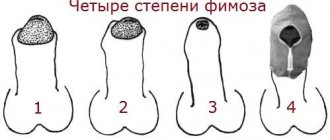Men should see a urologist at least once in their lives. Of course, it is worthwhile to undergo a doctor's examination every year, but, unfortunately, this rule is rarely observed in practice.
However, not a single representative of the stronger sex is immune from the need to visit this medical professional sooner or later. To find out about the condition of his genitourinary system.
Patients often want to know what a urologist for men does, and what are the features of an appointment with this specialist.
What tests will have to be done, and can a woman come to a urologist with her problems?
Who is a urologist and what diseases does he deal with?
Urology is a fairly extensive branch of practical medicine that deals with problems of the urinary system.
Doctors with a similar specialty develop and apply in practice various diagnostic methods, approaches to therapy and prevention of diseases of these organs.
Patients often believe that a urologist is a masculine doctor. There is nothing surprising in this, because mostly men visit the doctor, turning to him with a wide variety of complaints from the urinary system.
The doctor can treat the following diseases:
- cystitis is an inflammatory process in the bladder;
- urolithiasis - a pathology in which stones form in the kidneys, preventing the normal outflow of urine and injuring the mucous membranes;
- urethritis is an inflammatory process that affects the mucous membrane of the urethra;
- Enuresis is a deviation in which the patient is unable to restrain the urge to urinate;
- Prostatitis is a disease characterized by inflammatory processes in the prostate area.
A urologist, if we are talking about a representative of the stronger sex, often treats not only the urinary system, but also the reproductive system. This is explained by the fact that both systems are located in close proximity to each other. Often, if one is affected, the other is also affected. Moreover, for men, unlike women, there is no doctor who narrowly specializes in pathologies of the reproductive system.
A doctor can help with:
- various diseases of the testicle , such as hydrocele, varicocele, orchitis, epidymitis, orchiepidimitis, etc.;
- phimosis - an ailment in which the foreskin narrows so much that it does not allow full exposure of the head of the penis, and sometimes completely blocks the blood flow in it, leading to gangrenous changes;
- prostate adenoma - a pathology accompanied by benign tissue growth in the prostate gland;
- Prostate cancer is a very dangerous disease, accompanied by the transition of benign processes to malignant ones.
The doctor is able not only to correctly diagnose, but also to give the patient recommendations for treatment and prevention.
Most pathologies of the genitourinary system greatly reduce the patient’s quality of life. Therefore, it is not recommended to self-medicate.
Prices for urologist services
| Name of service | Cost, rub.) |
| Initial consultation with a urologist-andrologist | 3850 rub. |
| Repeated consultation with a urologist-andrologist | 3025 rub. |
| Laboratory research | Cost, rub.) |
| Complete blood count (+ESR) | 460 rub. |
| General urine analysis | 276 rub. |
| Iron | 173 rub. |
| Creatinine | 138 rub. |
| Uric acid | 138 rub. |
| Ferritin | 449 rub. |
| AT 12 | 736 rub. |
| Glycohemoglobin | 403 rub. |
| Ultrasound of the scrotum (with Doppler) | 3300 rub. |
| Kidney ultrasound | 3300 rub. |
| TRUS of the prostate (part of the “Men’s Health” complex - ultrasound of the kidneys, prostate gland, scrotum) | 7200 rub. |
Attention! Prices may differ from those shown on the website. Please check the contact information provided for current information.
Urologist and STDs
A male urologist is a doctor who often must know not only about inflammatory and non-inflammatory diseases without signs of an infectious process, but also about various infections. Naturally, the doctor treats nonspecific inflammatory processes. They can provoke balanitis, balanoposthitis, orchitis, orchiepidymitis, urethritis and other similar ailments.
However, a separate part of the work of such a doctor is sexually transmitted diseases.
It is often believed that STDs are the prerogative of venereologists. However, it is not always possible to visit a venereologist, and then a urologist can help if necessary.
When visiting a patient, a medical professional can help in the diagnosis, treatment and prevention of the following pathologies:
- trichomoniasis - an STD caused by Trichomonas - intracellular parasites, is difficult to diagnose due to a blurred clinical picture;
- chlamydia - a pathology provoked by chlamydia, characterized by the development of symptoms of urethritis;
- gonorrhea is an unpleasant disease that can greatly reduce the quality of life of patients; in men it is often accompanied by the discharge of a small amount of pus from the urethra in the morning;
- ureaplasmosis and mycoplasmosis are two diseases caused by opportunistic microflora, which can also significantly reduce the quality of life of patients;
- candidiasis is a fungal pathology characterized by the uncontrolled growth of an opportunistic fungus in the genital area, etc.
Of course, doctors recommend contacting a venereologist for signs of STDs. However, if you cannot visit a doctor in the near future, you can seek help from a urologist.
The reception is being conducted
Kravtsova Irina Mikhailovna Specialty: urologist Department of Uroandrology
Education
Moscow State Medical and Dental University named after.
A.I. Evdokimova. Specialty – general medicine, qualification – doctor (2002)
Residency in the specialty "Urology" (FGU Educational and Scientific Center, 2002-2004)
Certificates and achievements
- Certificate of advanced training “Fundamentals of Andrology” (MSMSU, 2003)
- Certificate “Urology” (FGU Educational and Scientific Center of the Medical Center of the Administration of the President of the Russian Federation, 2004)
- Certificate of advanced training “Ultrasound methods of diagnosis and treatment in urology” (FGU Research Institute of Urology, 2006)
- Certificate of advanced training “Laserology in obstetrics and gynecology” (MSMSU, 2006)
- Certificate of advanced training “Urogynecology” (GOU DPO Russian Medical Academy of Postgraduate Education of Roszdrav, 2007)
- Certificate of promotion. qualification "Magnetic laser therapy" (GOU DPO Russian Medical Academy of Postgraduate Education, 2007)
- Certificate of advanced training “Andrology” (GOU VPO MMA named after I.M. Sechenov Roszdrav, 2009)
- Certificate of advanced training in “Chinese acupuncture” (Institute of Rehabilitation Medicine, 2011)
- Certificate of advanced training in “Clinical andrology” (RUDN University, 2012)
- Certificate and diploma of professional retraining “Ultrasound diagnostics” (FSAOU of higher education RUDN University, 2015)
- Certificate of advanced training “Endocrine aspects of reproductive health” (Faculty of advanced training of medical workers of the RUDN Medical Institute, 2015)
- Certificate and certificate of advanced training “Urology” (Federal State Autonomous Educational Institution of Higher Education RUDN University, 2015)
- Certificate of advanced training in Neurourology (FGBNU Scientific Center of Neurology, 2021)
Irina Mikhailovna successfully treats male infertility, ejaculation and erection disorders, diagnoses and treats various types of urination disorders in men and women, treats CPPS, etc.
Practices an integrated approach to urinary disorders in neurological patients. Repeated participant of the ISSAM international congress.
More details
Make an appointment
Discomfort and pain when urinating, frequent urges, pain in the groin and lower back, blood in the urine are symptoms for which self-medication is unacceptable. It is necessary to make an appointment with a urologist to determine the cause of the ailment and undergo treatment. Ignoring the problem can lead to chronicity of the pathological process, complications and irreparable consequences, including infertility, impotence, and the need for a donor kidney transplant.
When should you consult a urologist?
It is clear what a urologist treats in men.
But not all representatives of the stronger sex know what complaints you should go to this doctor with. There is a whole list of complaints for which consultation with a medical professional is recommended.
Among them:
- itching, burning sensation in the urethra;
- complaints of any pathological discharge from the penis that has an atypical color or a sharp, unpleasant odor;
- pain localized in the lower abdomen, where the bladder is projected;
- the appearance of pain during sexual intercourse or immediately after it;
- frequent urge to go to the toilet or complete urinary incontinence in any form;
- the appearance of any pathological impurities (for example, blood or pus) in the semen or urine;
- formation of warts, condylomas and other pathological growths on the genitals;
- development of symptoms of impotence, appearance of signs of sexual impotence;
- the appearance of a rash of any shape, size, intensity, etc. in the genital area.
A separate important complaint with which men often go to the doctor is infertility.
Treatment of male infertility by a urologist is also carried out. The main thing is to undergo examinations recommended by your doctor to identify the cause of the deviation.
What to expect at your doctor's appointment? Step by step
- First, the doctor talks with the patient. He asks how the person is feeling, what problems are bothering him. To get a more complete picture of the disease, the doctor asks leading questions and finds out how symptoms change depending on the situation. The urologist must also familiarize himself with the patient’s life history, that is, find out what and when the person was sick with. It is especially important for him to ask about the presence of genitourinary diseases in a person’s life.
- Examination on the couch. The doctor will ask you to strip down to your underwear and lie on your back. This way he will be able to palpate the kidneys and adjacent organs.
- An appointment with a urologist for men also includes examination and palpation of the external genitalia: penis, scrotum. This is not painful at all and does not lead to unpleasant sensations if the tissues of these organs are not affected by pathology.
- Prostate examination. It is carried out only through the rectum. To do this, the patient will need to take a knee-elbow position or squat, having first removed all clothing below the waist. The doctor will insert a gloved finger lubricated with glycerin into the patient's rectum and palpate his prostate. This is a rather unpleasant procedure, but pain occurs only if the prostate is inflamed. Examination of the prostate may be accompanied by an erection. There is nothing wrong with this, even if you are being examined by a woman’s urologist - such a reaction should normally occur during this manipulation, the doctor does not experience any personal feelings. Rather, on the contrary, when palpating the prostate gland, it is important for a doctor, no matter what gender, not only to assess the size, density and uniformity of the gland itself, but also to analyze the level of erection.
Recommendations for preparing for examination by a urologist
Often patients are interested in the question of how a male examination is performed by a urologist. In fact, there is nothing difficult in preparing for a visit to the doctor.
Recommended:
- for several days before going to the hospital, avoid sexual contact, as it can blur the results of the research;
- stop using antiseptics at least 24 hours before the visit;
- carry out a simple toilet of the genitals the night before without any care products, simply treating them with running water;
- at least a week before going to the doctor, stop taking antibiotics, even if they are taken not because of urological complaints, but for other reasons;
- It is recommended to take a piece of paper and pen with you to your appointment to write down all the recommendations that the doctor gives.
Having properly prepared for the examination, the patient will give the doctor the opportunity to immediately take all the necessary tests to assess his condition.
In some cases, when it is planned to draw blood immediately during the examination, it is additionally recommended not to eat in the morning so as not to blur the test results.
How to choose a good specialist
In order to get an appointment with a urologist, you just need to make an appointment with him at the clinic’s reception desk. If another specialist recommends that a patient undergo a urological examination, he will prescribe additional tests for you. Many patients submit them to paid laboratories in order to get results faster. Let's tell you a little medical secret. Any doctor, including a urologist, with whom you have to make an appointment, trusts the laboratory of the institution in which he works more. If you need any additional analysis using rare or expensive reagents, the urologist himself will advise you to sign up for tests in a private laboratory of a good level, in his opinion.
What if you don’t live in a metropolis, and you can’t find a urologist in your latitude? How to make an appointment, and most importantly, where to find a good specialist?
Finding a doctor these days is not difficult. The addresses of clinics and private medical institutions are easy to find on the Internet, and you can also make an appointment without leaving your home. But you want to get examined by a good doctor, and not the one whose phone number caught your eye first! Therefore, we will risk giving you some advice to guarantee high-quality and competent service.
- The easiest way to find a good urologist is in a large clinic that has a urology department.
- Insurance agents who provide individual health insurance can make an appointment with a high-class doctor. They usually know the doctors well, not only personally, but also receive feedback from patients who have already used urological services.
We would not really recommend using the advice of colleagues and friends. Their experience was not necessarily successful; the psychological aspect of the reception is of great importance. If you still go to a urologist in a private institution, first check the availability of a license and diplomas of appropriate education. Serious honey. institutions do not hide them.
Progress of examination by a urologist
Often among representatives of the stronger sex the question is asked about what a urologist does for men during the initial appointment and subsequent consultations.
The examination often follows a standard procedure.
- History taking
Taking an anamnesis is an important stage of admission.
During it, the doctor clarifies how long ago certain symptoms appeared, how severe they are, and how much they reduce the quality of life.
The doctor must clarify information about the man’s sex life, urination characteristics, and stool. You shouldn’t be shy about the doctor’s questions, since they are all aimed at making a diagnosis as quickly as possible.
- Inspection
After collecting anamnesis, the doctor must examine the penis and genital area. During the examination, you can detect signs of swelling, scratching indicating itching, and rashes.
The examination also allows you to assess the correctness of the anatomical formation of the genital organs. This may also be important for diagnosis.
- Purpose of tests
Any disease in the modern world is finally diagnosed after it is confirmed by tests. The doctor prescribes a list of tests in each case individually, based on the symptoms the patient complains of.
- Selection of therapy
The choice of treatment is always the last step in treatment. It is possible when the final diagnosis has already been made.
Prevention of urological diseases
To avoid urological diseases, doctors recommend following simple rules:
- Underwear should fit you in size, be made from soft natural fabrics, and provide good air exchange.
- Eat right and exercise.
- Avoid casual sex. Use protective equipment.
- Don't sit on cold surfaces. Dress appropriately for the weather.
- Maintain personal hygiene.
- Get checked regularly by a specialist.
What tests can a urologist prescribe?
What tests are taken in men at an appointment with a doctor specializing in urology is a frequently asked question.
In addition to standard blood and urine tests, a urethral smear is required.
A urological smear is a procedure that is uncomfortable for most males.
However, the analysis makes it possible to diagnose many diseases. Therefore, it just needs to be rescheduled if the doctor has given a recommendation to take it.
As doctors note, a smear after collecting material can be examined in different ways. First of all, it is checked under a microscope, paying attention to the presence of atypical cells and pathogenic microorganisms. After examination using a microscope, the smear can be inoculated on a nutrient medium or transferred to the laboratory to perform PCR.
Both studies are aimed at diagnosing sexually transmitted infectious diseases.
In case of infertility, men are offered a spermogram.
The study allows you to assess the patient's fertility. Understand how strongly the genital organs are involved in the identified pathological processes.
Preparatory steps before admission
You will need virtually no preparation if your visit to the urologist is only a consultation. But even in this case, the doctor may need the results of certain tests. It is precisely for their delivery that careful preparation may be required.
Our urologists perform examinations using the latest equipment. An ultrasound machine helps to examine the problem more carefully and make the right decision.
So what preparations should precede a trip to the urologist? The patient's actions should be as follows:
- Two days before the appointment, you cannot have sexual contact;
- It is necessary to thoroughly cleanse the intestines with an enema;
- A couple of hours before the examination, the bladder should be full;
- Carrying out thorough intimate hygiene.
All this preparatory work is quite simple and can be done at home.
Methods for diagnosing urological diseases:
- Calling a urologist to your home
- Diagnosis of kidney diseases
- Diagnosis of bladder diseases
- Diagnosis of prostate diseases
- Diagnosis of scrotal diseases
- Diagnosis of sexually transmitted infections
- Urine tests
- Tests for STIs
- PSA tests
- Ultrasound at home
- Kidney ultrasound
- Ultrasound of the prostate
- Ultrasound of the bladder
- Urological ultrasound at home
- Urethral swab
- Ultrasound of the penis
- Transrectal ultrasound
- Prostate juice tests
- Ultrasound of the genitourinary system
Urologist or andrologist: where to go for prostate diseases
Often among representatives of the stronger sex the question is asked in the doctor's office about where to go if there are signs of prostate disease. In this case, first of all, you should visit an andrologist.
Andrologist is a doctor specializing in prostatitis and other diseases of the prostate gland. This is not an isolated specialty, but part of urology. Therefore, many urologists part-time act as andrologists.
A urologist examines the prostate through the rectum.
A standard digital rectal examination is performed.
During which the doctor gets the opportunity to evaluate the structure of the prostate gland, its size, shape and other features. If digital examination shows any abnormalities, additional tests are prescribed.
Also, during the examination using a finger, the doctor can take prostate juice for analysis.
There is often interest in why a urologist checks the prostate. The fact is that among representatives of the stronger sex, especially after 40 years, dangerous pathological changes often occur in this organ. Only timely diagnosis can prevent tragic consequences.
Some tips if the urologist is a woman
Sometimes, at an appointment with a urologist, men become isolated and cannot talk about sensitive problems. One of the most common reasons for this is when a man is examined by a woman’s urologist.
Even though medical issues are being resolved in the specialist’s office, the man is seized with panic. From a psychological point of view, the patient does not want to show his weaknesses.
Advice for a man if the urologist is a woman:
- Think about your health. First of all, you did not come to flirt, get acquainted or start a family in the urology office, but to solve your problem.
- The doctor saw something different. Remember that a urologist examines a huge number of patients every day, and in 20 minutes another shy man will see her.
- Medical ethics. A doctor does not have the right to talk about small penis size and disseminate information about the presence of diseases.
Calm down and go into the doctor's office with confidence. If a urologist is a woman, this does not mean that she is a bad specialist. Trust her medical instincts, do not discriminate based on gender, and follow your doctor's instructions.










